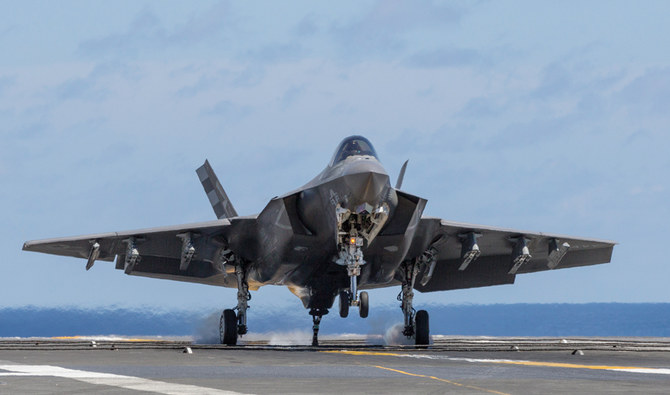ANKARA: American pressure is mounting on Turkey to ditch its purchase of a Russian missile defense system or face being squeezed out of a multi-billion-dollar fighter jet program.
The US is threatening to drop Turkey as a partner in the F-35 warplane project unless it pulls back from buying the Russian-made S-400 weapon system — and takes America’s Patriot version instead, according to a new Reuters report based on American sources.
Experts have warned that being removed from the F-35 program could seriously damage Turkey’s defense industry.
But Turkish President Recep Tayyip Erdogan emphasized that his country would not step back on the purchase of the S-400 system, which would be deployed around the capital Ankara.
Washington views the prospect as presenting a serious security risk, as Moscow might have access to US technology and aircraft when integrated into allied networks — something that would harm Turkey’s trustworthiness during a possible military crisis.
Ankara, a long-time partner in the F-35 program, remains quite confident that it will not be cut out by its NATO ally, but the US said the 800 plane components produced by Turkey are not irreplaceable.
The F-35’s fuselage, landing gear and cockpit displays are currently manufactured in Turkey, and replacing Turkey is not expected to delay production for more than a couple of months.
Turkey’s insistence on buying the Russian defense system is likely to further undermine the already complicated relations between Ankara and Washington.
Aaron Stein, director of the Middle East program at the US-based Foreign Policy Research Institute, said the US Department of Defense (DoD) had been looking at the Turkish role in the F-35 program for more than a year and identifying alternative suppliers for parts being made in Turkey.
“Most of the Turkish-produced parts are also made elsewhere, but there are a few instances of Turkey being the single-source supplier,” he told Arab News.
“This is where DoD has focused its efforts for the past year and is now seemingly prepared to move ahead if Turkey is removed from the consortium,” Stein added.
Acting US Defense Secretary Patrick Shanahan recently said that he wants Turkey to remain in the F-35 program, but that Ankara needed to buy his country’s Patriot missile defense system.
Sinan Ulgen, a former Turkish diplomat who chairs the Istanbul-based Center for Economics and Foreign Policy Studies, said that although it would be costly to remove Turkish companies from the F-35 production chain and could lead to some delays in delivery of the aircraft, technically it would be possible.
“In some cases, some of the materials are already produced by other non-Turkish companies. Production would be directly switched to them. In other cases, new production units would be added,” he told Arab News.
If ditched, Ulgen noted that the Turkish defense industry would lose the important advantage of being part of a multi-billion-dollar multi-national strategic defense procurement initiative.
“It would also negatively impact the technological leap prospects of Turkey’s defense industries,” he said.
Overall, according to Ulgen, the alliance’s cohesion would be impacted negatively by an escalation of tensions between the US and Turkey.
“On both sides, questions will resurface about mutual commitments to each other’s security challenges,” he said.
On Thursday, four US senators presented a bipartisan bill to forbid the transfer of F-35 fighter aircraft to Turkey until the US government verified that Ankara would not take the Russian air-defense system.
According to Megan Gisclon, a researcher on US-Turkey relations at the Istanbul Policy Center, leaving Turkey out of the F-35 program does not bode well for the future of the alliance.
“Although these recommendations have more or less been on the table for quite some time, the fact that such a bill is coming up again shows that Congress is not likely to let go of the issue until either sanctions are implemented or Turkey drops the S-400,” she told Arab News.
Based on Shanahan’s latest statements, Gisclon believes the Pentagon has not given up on Turkey’s participation in the F-35 program.
“However, what the process may be for Turkey to leave the S-400 behind and purchase Patriots is hard to imagine at this point,” she said.














